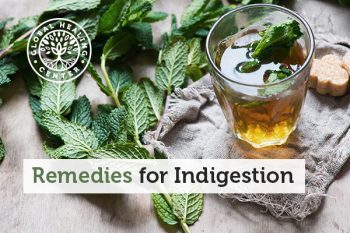Guest writer for Wake Up World
For most of us, mealtime is a pleasure. Sometimes, though, eating brings the uncomfortable symptoms of an upset stomach, or indigestion. One in four people experiences it occasionally or regularly.[1] While there are a variety of over-the-counter and prescription drugs that claim to target the symptom, effective natural remedies to improve your digestion are readily available in your pantry.
What is Indigestion?
Sometimes called dyspepsia, indigestion causes a painful, burning sensation in your upper abdomen. It may also cause you to feel uncomfortably full during or after a meal, or to burp more than usual. This condition typically affects the stomach and the esophagus, which comprise the upper part of your gastrointestinal (GI) tract.
[pro_ad_display_adzone id=”110028″]
Symptoms of Indigestion
- A burning sensation in your stomach or upper abdomen
- Bloating
- A sensation of pressure
- A growling stomach
- Acidic taste in your mouth
- Nausea or vomiting
- Diarrhea or constipation
Dyspepsia is not dangerous, but it can affect your quality of life. In order to appreciate your meals and get the full nutritive value of your food, you’ll want to keep your digestive system running smoothly.
Indigestion is not the same as heartburn — also called acid reflux — which causes a burning sensation in your chest because stomach acid has entered the esophagus. However, indigestion and heartburn often show up together.
Top 9 Indigestion Remedies
The good news is that you can reduce or manage indigestion by living a healthy lifestyle, making smart choices about your diet, and looking to therapeutic plants and nutritional supplements when needed. All of these remedies have the added bonus of supporting your overall health. Most of these natural remedies are safe but always ask your healthcare provider if you are pregnant or have any specific condition.
1. Apple Cider Vinegar
My personal favorite is adding one tablespoon of ACV — organic, raw apple cider vinegar — into a glass of purified water (if you’re brave, or experienced, you can also drink the ACV as a shot). Rich in nutrients and probiotics, ACV counteracts an upset stomach and heartburn with enzymes — natural chemicals that break down food so you can absorb the nutrients. The ash (minerals) in ACV promotes proper pH balance in our body.
Take one tablespoon in half a glass of water before or after a meal. Be sure to shake the bottle first to mix the cloudy “mother of vinegar” on the bottom. Try adding a squeeze of lemon into the water as well.
2. Ginger
Many traditional plant remedies are highly effective at reducing indigestion.[2, 3] One of the most well-known and oft-used is ginger root. Studies show that ginger reduces nausea and vomiting, and it may help prevent ulcers.[4]
You can chew a bit of peeled, fresh, raw ginger root before or after a meal, or brew it into a tea. Ginger in any form helps protect the stomach and prevent indigestion symptoms such as cramping, bloating, and nausea.
3. Licorice Root
Licorice root comes from a plant in the pea and bean (legume) family. Its anti-inflammatory and analgesic properties help ease indigestion symptoms by protecting the mucus of your stomach lining.
You can consume it the same way as ginger — in tea, or chewed raw if you can find it. You can also take it as a supplement called DGL, or deglycyrrhizinated licorice.
4. Fennel Seeds
Fennel is a Mediterranean plant in the carrot family with a licorice-like flavor. Its oil has many therapeutic uses. Fennel seeds help calm muscle spasms and reduce the gas and nausea of indigestion. If you dine in Indian restaurants, you may see a small bowl of them on the table.
Try chewing on half a teaspoon of seeds after meals. Alternatively, add one half-teaspoon of fennel seeds to boiling water, strain, and drink as tea.
5. Black Cumin Seed
The flowering plant Nigella sativa — also known as black seed, black cumin, and black caraway — has been known since at least the time of King Tut to protect the stomach lining, fight inflammation, and repel harmful bacteria.[5] Black cumin seed is a commonly used natural remedy for GI problems like indigestion.
You can chew black seeds whole, ground, or boil them in water to make tea. You can also use organic food-grade black cumin seed oil internally, in small amounts.
6. Peppermint Oil
Peppermint essential oil has many therapeutic properties, including relief for GI problems such as indigestion and heartburn.[6] As an anti-spasmodic, peppermint oil relaxes stomach muscle contractions associated with pain, bloating, and nausea. Peppermint oil also helps fight harmful bacteria.
You can take peppermint oil as a supplement in capsule form, apply it to the skin blended with a carrier oil, or use a few drops to make an after-meal tea. Be careful, though: If you have gastroesophageal reflux disease (GERD), peppermint could worsen your symptoms. An herbal tea such as chamomile is a better choice.
7. Digestive Enzymes
Digestive enzymes help break down dietary fiber, protein, carbohydrates, and fats. While the body produces these, we also get them from certain foods — like papain in papaya or bromelain in pineapple. When you don’t get enough digestive enzymes — whether through your diet, or your body does not produce them properly — it may cause indigestion.
As you age, your body produces fewer digestive enzymes, making supplementation more important. Eating raw foods also boosts the body’s production of enzymes. If you do not eat many raw vegetables and fruits, try taking a supplement that contains a blend of digestive enzymes, or one with papain or bromelain, to help indigestion.
[pro_ad_display_adzone id=”110030″]
8. Probiotics
Probiotics are helpful bacteria or microbes that support digestive health. When “bad” gut bacteria outnumber the good ones, health problems can result, including GI ailments like indigestion. Supplementing your diet with probiotics can help restore the balance. A recent study[7] found that people with functional dyspepsia have different gut microbes, but something as simple as eating yogurt with Lactobacillus for several months restored healthy probiotic flora and reduced indigestion symptoms.
Taking a probiotic supplement or increasing your intake of probiotic-rich foods, like sauerkraut, kombucha, miso, and other fermented foods is a great way to boost your gut health.
9. Baking Soda
Sodium bicarbonate, also known as baking soda, is a popular indigestion remedy because it quickly neutralizes excess stomach acid and re-balances the body’s pH. Mix half a teaspoon of baking soda in a glass of water and drink it after a meal. If you’re taking medications, make sure it’s been an hour or two after your last dose before taking the baking soda.
What Causes Indigestion?
The root cause of most indigestion lies in what you put into your body. If you eat certain foods or combinations of food, you may end up with indigestion. These factors may increase your chance of experiencing indigestion:
- Eating fried, fatty, or spicy foods
- Eating acidic foods such as tomatoes or citrus fruit
- Eating dairy if you are lactose-intolerant
- Eating too much or too fast
- Smoking
- Drinking excessive alcohol
- Drinking caffeinated drinks such as coffee or soda
- Taking certain medications, including NSAIDs (non-steroidal anti-inflammatory drugs, such as ibuprofen) and some antibiotics
Several conditions can lead to indigestion. Indigestion is common during pregnancy, stress can cause indigestion, and overweight and obese individuals may also have more dyspepsia. Even hormone imbalances can contribute to increased indigestion.
How to Avoid Indigestion
The best way to treat indigestion is to not get it in the first place. Ideally, you should eat a whole-food, plant-based diet, not smoke, and avoid medications and food that trigger an upset stomach. Here are some practical ways you can prevent indigestion:
- Eat slowly and chew your food completely. If you rush, you may swallow air, which can prompt indigestion.
- After eating, wait a while before exercising.
- Wait two to three hours before lying down after a meal.
- If you need to lose a few pounds, start a fitness regime or diet program.
- Reduce your stress with meditation or yoga. (See: 10 Fun Ways To Reduce Your Cortisol Levels)
When Indigestion is Something Else
About one-quarter of people with indigestion-like symptoms may have an underlying condition.[8] Some of these include:
- Gastroesophageal Reflux Disease (GERD) (where stomach acid irritates the lining of your esophagus)
- Irritable bowel syndrome (IBS)
- Irritable bowel disease (IBD)
- Peptic ulcers (a sore in the lining of the stomach or intestine)
- Gallbladder issues, such as gallstones
- Infection with H. pylori or other types of harmful bacteria
- Gastritis (an inflamed stomach lining)
- Gastroparesis (a condition in which the stomach cannot fully empty)
- Celiac disease (inability to digest gluten)
- Anxiety or depression
Consult a healthcare professional if you’ve had indigestion for more than two weeks, are in severe pain, or your indigestion includes any of the following symptoms:
- Unplanned weight loss or appetite loss
- Vomiting blood
- Black, tarry stool
- Trouble swallowing
- Extreme fatigue
If your indigestion includes shortness of breath, sweating, or chest pain that spreads to your arm, neck, or jaw, go to the emergency room.
Points to Remember
Indigestion, or dyspepsia, is a common set of symptoms that include upper abdominal pain, fullness, and nausea during or after eating. Smoking, medication, and eating fatty, fried, or acidic foods are some of the factors that can trigger indigestion.
You can usually manage indigestion through diet and lifestyle changes. Apple cider vinegar, digestive enzymes, probiotics, and ginger or licorice root are a few of the remedies that provide relief to many. You can also take it a step further and try to prevent digestion before it starts by eating slowly, losing weight, and practicing relaxation.
Recommended articles by Dr. Edward Group:
- Study Finds Antidepressants to be Depressingly Ineffective
- The 9 Best Fermented Foods for Your Gut
- 14 Foods that Cleanse the Liver
- Top 5 Foods for the Pineal Gland
- The Importance of a Kidney Cleansing Diet
- The 9 Best Herbs for Lung Cleansing and Respiratory Support
- 7 Best Foods to Support Kidney Function
- How Fluoride Damages Pineal Gland Health
- 10 Uses for Organic Oregano Oil
- Lung Cleanse: 10 Ways to Detox Your Lungs
About the author:
Dr. Edward F. Group III (DC, ND, DACBN, DCBCN, DABFM) founded Global Healing Center in 1998 with the goal of providing the highest quality natural health information and products. He is world-renowned for his research on the root cause of disease. Under his leadership, Global Healing Center earned recognition as one of the largest natural and organic health resources in the world. Dr. Group is a veteran of the United States Army and has attended both Harvard and MIT business schools. He is a best-selling author and a frequent guest on radio and television programs, documentary films, and in major publications.
Dr. Group centers his philosophy around the understanding that the root cause of disease stems from the accumulation of toxins in the body and is exacerbated by daily exposure to a toxic living environment. He believes it is his personal mission to teach and promote philosophies that produce good health, a clean environment, and positive thinking. This, he believes, can restore happiness and love to the world.
For more, please visit Global Healing Center.
[pro_ad_display_adzone id=”110027″]








